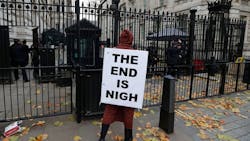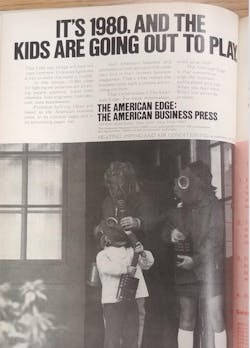Since I began writing this column in 2013, I have strongly advocated for readers to become more knowledgeable about the science of climate change and sea level rise, and to eschew the political rhetoric – from both sides of the aisle – that has often drowned out the voices of reason.
Although nearly all of the messaging these days, even from well-regarded scientific sources, is one of doom-and-gloom – the latest, a UNESCO report warning that nearly one million species may risk extinction within decades! – I remain confident that science and society will still find solutions before the predicted demise of our planet in the next 20 to 30 years.
Why? Well, growing up in Southern California in the 1960s, I heard a lot of scary predictions. In school, we had regular drills in which the teacher would shout “Drop!” We would all drop to the floor, get under our desks, facing away from the windows, with our hands over the back of our necks. The purpose of the drills was two-fold: for protection against earthquakes and, even more frightening, against nuclear attack. This was at the height of the Cold War and we were constantly being reminded that we could be vaporized at any moment. The “end-of-the-world” predictions reached a crescendo during the Cuban Missile Crisis in October 1962. While covering that crisis, journalist I.F. Stone reportedly said, that as he walked down the Capitol steps one day, he truly thought it might be his last night on Earth.
So the stakes seemed pretty high back then, too.
During the 1960s and 70s, there were also apocalyptic predictions about:
- Energy ("The U.S. will run out of oil by 1976.");
- Air Pollution (LIFE magazine, 1970, “In a decade, urban dwellers will have to wear gas masks to survive air pollution… By 1985, air pollution will have reduced the amount of sunlight reaching Earth by one half.”);
- Natural Resources (the National Academy of Sciences predicted that the Earth would run out of lead, zinc, tin, gold, and silver before 1990, and copper, by 2000.); and
- Animals (LOOK magazine, reported a Smithsonian Institute prediction that, by 1995, 75 to 80 percent of all living species would be extinct.
- An ad from this publication, 1972.
There were also dire predictions about climate change even then. In 1970, Prof. Kenneth Watt, an ecologist at the University of California, warned, “The world has been chilling sharply for about 20 years. If present trends continue, the world will be about four degrees colder for the global mean temperature in 1990, but 11 degrees colder in the year 2000. This is about twice what it would take to put us into an ice age.” Obviously, Mother Nature ignored his prognostications and decided instead to warm our planet, not cool it.
My point is, there have always been Chicken Littles predicting that the sky is falling. But, somehow, civilization has managed to keep propping it up. Should we be alarmed at the very real environmental and social issues that we are facing? Of course we should. And we should be continually searching for real solutions.
But turning these issues into political fodder for those seeking – or worse, trying to hold on to – public office, does nothing but hinder the progress of those who are really trying to fix the problems.
A regular contributor to HPAC Engineering and a member of its editorial advisory board, the author is a principal at Sustainable Performance Solutions LLC, a south Florida-based engineering firm focusing on energy and sustainability.










